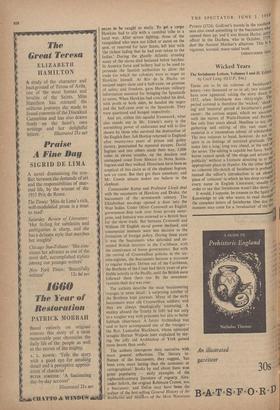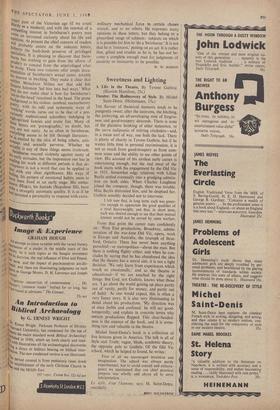Wicked Years
THERE are to be six volumes of Swinburne's letters—two thousand or so in all; two volunles have now appeared, taking the story down to 1875, when Swinburne was thirty-eight. The period covered is therefore the 'wicked,' shoci:- ing' and 'immoral' period of Swinburne's poet career: the curious sequel, which we associate with the names of Watts-Dunton and Putney, lies only four years ahead. Needless to say, the gathering and editing of this vast mass of material is a tremendous labour of scholarshiP. The two volumes to hand, however, do not 111" spire in us feelings of unmixed gratitude. The, index lies a long, long way ahead, at the end .01 the series. The editing is capable but fussy. Svon; burne cannot speak of 'the slings and arrows of publicity' without a footnote directing us to the'; appropriate place in Hamlet. On the other hano,/ no coherent life-sketch of Swinburne is prefixed;.{ instead the editor's introduction is an absurnol piece of 'criticism' in which he lets drop virtually01 every, name in English Literature, usually 111,;;t order to say that Swinburne wasn't like them. lip It would, I suppose, be treason to the Spirit e/Lei Knowledge to ask who wants to read through the complete letters of Swinburne. One day the, moment may come for a 'revaluation' of the last THE SPECTATOR. JUNE 3, 1960 Hardy poet of the Victorian age (if we count 'lardy as a modern), and with the renewal of a compelling interest in Swinburne's poetry may come an increased curiosity about his life and opinions. At present the chief concern of readers will probably centre on the indecent letters, hitherto the hush-hush preserve of privileged specialists. It is pleasing to discover that Swin- burne
has nothing to gain from the efforts t,f Prudery to conceal from the unprivileged what
he wrote. These two volumes offer ample docu- Plentation of Swinburne's sexual tastes, notably his. interest in birching. They make it clear that ..oeither Monckton Milnes nor that odd fish tii'llaeon Solomon led him into bad ways.' What do not make clear is how far Swinburne's Lsex-M-the-head' remained in the head. The prose background to his violent,, cerebral, masturbatory poetry,i With its odd and systematic ways of
words, turns out to be that of a pre-
ch?c,'°uslY sophisticated schoolboy indulging in these fancies and erotic fun. Many of they letters are 'pornographic,' no doubt, but weY are not nasty. As so often in Swinburne, hverYthing seems to be felt through literature: "e is excited by the idea of being atheist, anti- „11,ao and sexually perverse. Whether he
is any of these things seems irrelevant.
h.'3wInburne reacted violently against many of rAls,,,earY attitudes, but the impression one has in ,,umg his work at different periods is that de- h°Pozent is not a word that can be applied to With any clear significance. His ways of liTfeeling, his pattern of emotional habits, seem to .'ive been fixed at an early stage. His enthu- siasms (Hugo), his hatreds (Napoleon i
111), have
alike a strangely automatic quality. It is as if he had invented a personality to respond with extra- ordinary mechanical force to certain chosen stimuli, and to no others. He expresses many opinions in these letters, but they belong to a prescribed range of subjects: subjects on which it is possible for him to `do a Swinburne.' It is not that he is 'insincere,' putting on an act. It is rather that, gifted and erudite as he is, he has not be- come a complete enough man for judgments of sincerity or insincerity to be possible.
W. W. ROBSON



































 Previous page
Previous page